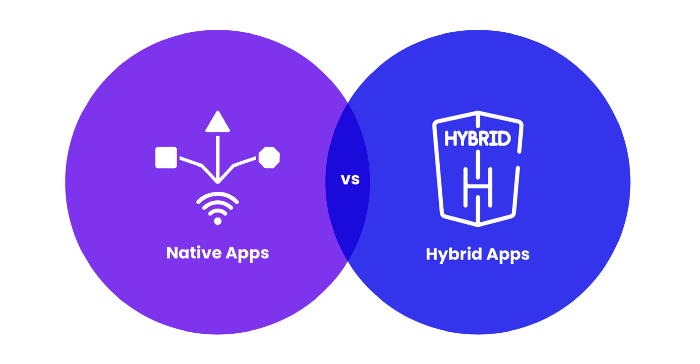What’s the difference??
There’s no denying the fact that today we have an app for almost everything and by everything I mean EVERYTHING! All the comfort is available to us at our fingertips as consumers and users of those apps. But, that also leaves countless questions and a lot of confusion on native vs hybrid app development, for the stakeholders or businesses, especially those who are just starting out. And through this blog, I will try to clear out that confusion by providing you insights from my learnings as a developer.

Before we start comparing native and hybrid technologies, it is important to understand that each of them has its own advantages and drawbacks and your final decision should be based on your business objectives, budget, and app development speed.
Now, before starting with the differences, let us first learn about native and hybrid applications.
What is Native App Development?
Native mobile apps are built for specific platforms & are written in the language that accepts the platform. For example Java or Kotlin for native Android apps and Swift and Objective-C for native iOS apps. It has a quick execution and a high degree of accuracy. Native apps are also built using the specific IDE for the selected operating system. Like Android Studio for Android apps and Xcode IDE is used for iOS apps. This means that you have to build especially for each platform, which would require a large amount of budget.

Benefits of Native Apps:
High Speed: Since native mobile apps don’t come up with complex code like hybrid and cross-platform apps, they turn out to be comparatively faster.
Offline Functionality: Native apps work flawlessly even in the absence of internet connectivity. This ensures greater convenience for the users as they get to access all the app functionalities even during airplane mode or in an offline environment. This offline support functionality in Native Apps is essential for app users living in areas with low Internet connectivity, remote areas, or limited data availability.
More Intuitive & Interactive: Each mobile platform has unique UI/UX standards. Native app developers stick to these standards, making applications look and feel like an integral part of the operating system. Such intuitive and interactive solutions enhance the user experience. People can easily interact with a new app because they are familiar with the layout and gestures required to perform any action.
Minimized Scope of Bugs: It becomes a challenging task to manage two different codebases as compared to the same codebase. Since native apps have a single codebase and do not depend on cross-platform tools, they come with minimal occurrence of bugs.
Security: Nowadays Data security is the first priority for any digital platform. In this regard, native apps offer better security than cross-platform apps. Native applications are designed for a single platform, so data is encrypted within a single infrastructure, reducing the number of risks.
Drawbacks of Native App Development
Costly: Creating native apps can be expensive when you need to launch them for both iOS and Android. This means that you have to deploy two teams working on different platforms.
Time Consuming: Native app development is time-consuming as the work done for one platform cannot be duplicated for another. Instead, a separate team is needed to work on the other version.
No Code Reusability: If native apps are to be built for iOS and Android separately, you’ll have to do the coding part and develop the apps for both the mobile operating systems. And this would demand a lot of time, effort, costs, and resources, unlike the hybrid mobile apps.
Tools for Android App Development:
Tools for iOS App Development:
What is Hybrid App Development?
Hybrid mobile apps are built for multiple platforms and behave like native apps. Also, they are a combination of a native app and a web app. These types of apps are built with HTML, CSS, and JavaScript. The hybrid apps usually have functionalities similar to a web app as it is based on the web app.

Benefits of Hybrid Apps
Reuseable: This is the biggest advantage of hybrid apps. Developers write code once and it runs on any platform. No need to create separate codebases for Android or iOS. Once the code is created, you can use it anywhere.
Easy Maintenance: There is no need to hire two large teams of developers and spend months or years on developing. A small team of professionals can create, test, and launch a product within a relatively short period of time. As there is only one code base, you can add as many functionalities as you want to multiply the versions of your app.
Cost-effectiveness: The price for developing hybrid apps is not as high in comparison with the development of Native applications due to the short amount of time required for the team to write a not-so-complex code. This approach enables targeting multiple platforms without creating multiple codebases.
Cons of Hybrid App Development
Internet Connection / Slower Performace: Hybrid apps are websites at their core and require a constant internet connection to provide the full range of features to the users. Also, comparing hybrid vs native apps, we must say that hybrid apps take longer to load all their elements and, respectively, they may work slower.
User Experience: The interface used by the hybrid app is poor in terms of user experience. Since each operating system works differently, the design of hybrid applications may not be suitable for all of them. For example, if a hybrid app is developed as per the requirement of Android OS, then the experience may be bad for iOS users and vice-a-versa.
Debugging: No matter how proficient a developer is at coding, there is always a tendency for errors and bugs. Debugging and locating the exact problem can be a difficult task as the code is written for multiple platforms. So the developer needs to be extra careful not to introduce new bugs.
Functionality: Since the code is the same for all platforms, hybrid apps are missing some native features. As a result, users cannot expect a maximum level of quality and stability when it comes to hybrid apps. Especially for applications with complex features.
Hybrid App Development Frameworks:
The ultimate difference between native and hybrid apps
The main difference between native and hybrid apps is that native mobile apps are developed for a specific platform either Android or iOS, so they are built on the respective programming languages. For example, iPhone apps are written in Objective-C, Swift and Android apps are written in Java or Kotlin accordingly. Meanwhile, hybrid mobile apps are built with multiple web technologies and rely on cross-platform methodology.
To Sum Up…
Both Native apps and hybrid apps have their own advantages and disadvantages. But while deciding which technology to choose your choices should be based on the points discussed above.
Native applications provide smooth performance and a great user experience which are the key features to stay ahead in today’s competitive market. But keep in mind, implementing that idea requires a lot of time and money. On the other hand, if you need a simple app, then there is no need to spend much on it because hybrid technology is enough for a simple app.
Hope this helps everyone in making a good choice for their next app 🙂







